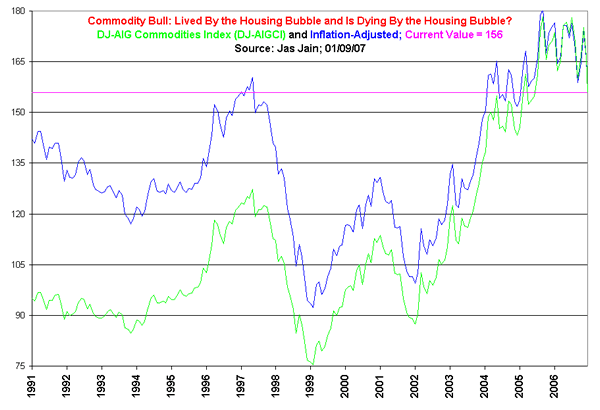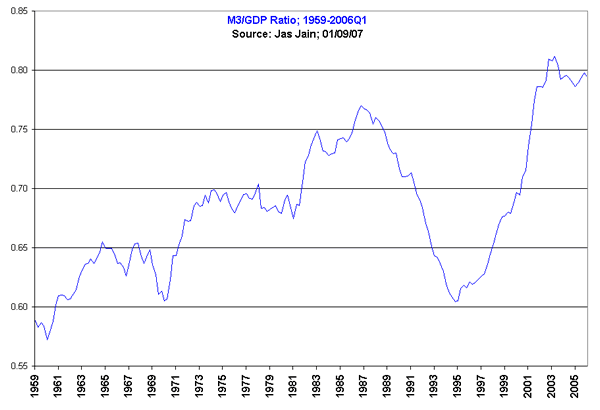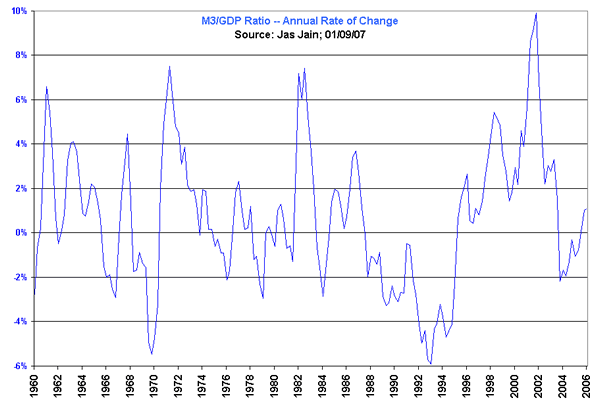Is the Commodities Bull Getting Buried Under the US Housing Rubble?
Commodities / Analysis & Strategy Jan 10, 2007 - 10:15 PM GMTBy: Jas_Jain
Is the Commodities Bull Getting Buried Under the US Housing Rubble?
Please look at the following graph and see if you can spot correlation between the US Housing Bubble and the DJ-AIG commodity index (DJ-AIGCI, a balanced index of various complexes) bubble of recent years.

The home sales peaked in 2005Q3, but the residential construction, in all likelihood, peaked during 2006Q3. Both these housing peaks are well reflected in the peaks in the commodities index. The US housing did nothing much during 1991-2001 and the same goes with the DJ-AIGCI (actually, down a little during the eleven years). The Housing Bubble started in 2002 and so did the Commodities Bull. No?
How Is This For Anecdotal Evidence?
I was watching Dennis Gartman a few days ago on Bloomberg/CNBC talking about what was going on in commodities. He commented that one could have seen the break in commodities coming (after the peak last year, around mid-year) when doctors, lawyers, etc., were getting interested. I can add engineers to the list of professional who get exited about investments during bubbles, when making money seems as easy as getting aboard.
During the middle of last year, I had a long conversation with one friend, who is a retied physician, and an e-mail exchange with another friend, who is an engineer, asking about investing in commodities. I dissuaded both of them because I was left with a very uneasy feeling about commodities after a dinner with couple of friends, who are also engineers, in May of 2006. One of them had been correctly bullish on commodities, in general, and copper, in particular, for the past few years. However, as I saw that the Housing Bubble was already in the process of deflating, I thought that his good run would end as the demand for commodities will decline, especially, with the likelihood of a recession in early 2007 based on the Yield-Curve. I am still sticking with my forecast of recession to begin during 2007Q1.
This friend posited a simple thesis that most people buy new tools, or this, or that, made out of metals, all the time and, thus, the demand will simply keep increasing as the population keeps increasing. He simply ignored all the historical evidence about how cyclical this demand really is. His argument appeared to me as another one of those New Era arguments to justify ever-increasing prices. The thing about people who are smart or lucky (and this friend is in the former category) enough to enjoy a good run with an investment is that they can't imagine the turn coming any time soon. They get enamored by the bull run and the bull takes control of their thinking. Selling early, rather than late, doesn't come easy to most people after they get used to enjoying oversized gains in a bull market. It is very hard to get someone like myself, who sees deflation and depression during the coming years, to get interested in commodities. I didn't anticipate the Housing Bubble, until it was already underway, so I decided to sit out the commodities bull market because it wasn't going to last past the Housing Bubble. Looks more and more like that it would turn out to be the case.
Commodities Bulls and Inflationists
Most, not all, commodities bulls are inflationists. Their clear leader is Marc Faber, whom I have Christened Dr. Doomed after reading this comment:
"The only commodity in oversupply in the world is the dollar. The dollar will lose value to the only currency of integrity -- gold and silver. Rising commodities are a disaster for bonds. The worst investment anyone can make is to buy a 30-year US treasury bond. It is so bad that you should buy it and frame it and show your grandchildren how US treasuries became worthless over time."
Dr. Doomed will live to regret this comment as commodities, excepting gold, lose more than 50% in terms of the US "paper" dollar within this decade. Don't be surprised if most commodities, including copper, lose more than 75% in dollars, from their recent highs. Needless to say that when that happens the US Treasuries will soar. Dr. Doomed is also guilty of repeating the lie about "Fed Printing Money." There is no such thing going on, or likely to go on. Yes, Fed has created the climate that has led to ever-increasing debt, but it has nothing whatsoever to do with "Printing Money." Expanding credit in the private sector does not equal Printing Money. Once the Housing Bubble bursts, Fed may not be able to encourage the private sector to lend more, or borrow more. That is when the game stops and there would be no helicopter drops of bundles of money. Politicians will intervene when the housing defaults reach 5-10 million a year, but there would be no printing of money, rest assured, until the US political system is at the brink of collapse. Then all bets are off. But we are at least ten years away from that scenario to develop.
M3 Conspiracy Theorists
Even before the Fed announced the discontinuation of reporting of M3, I had concluded that M1 and M2 were the best money supply measures as far as GDP growth and inflation rates were concerned. In this case, Fed did the right thing by discontinuing M3 reporting. However, inflationists took this as a sign of hiding the "real" inflation rate. My friend George Ure, at Urban Survival, was screaming about 11.5% inflation rate last week based on some estimates of the annual growth rate in the estimated M3.
Here are the charts of M3/GDP ratio as well as the annual rate of change in M3/GDP ratio.


You can make whatever you want of it but it doesn't show any inflationary expansion as of 2006Q1. Yes, there was a monetary "explosion" preceding the twin bubbles, first in stocks and then in housing. Now that those bubbles have burst the monetary explosion has stopped. What people need to think about is: Is the money supply the cause or the effect? Noting the fact that the stock market is a debt substitute, monetary explosion requires rapid increase in private debt. Now that we are approaching the Peak Debt, because households are suffering from too much debt (TMD), the monetary explosion would be very hard to induce. Conditions are not always ripe, or suitable, for an explosion in the money supply. In Fig. 2 you can clearly see periods of significant contraction in the M3/GDP ratio.
I can say lot of negative things about Bernanke, but he will NOT inflate. Yes, he will try very hard to stop deflation, but he would fail because there are limits to Fed's control of the economy. The reason he would fail is that he is very explicit about how he would go about stopping deflation - by "boosting the aggregate demand." Well, what if people decide not to consume more out of various constraints due to their personal financial circumstances? Please don't tell me that the govt. and the Fed can control the economy as when they choose and as they please. Sometimes they can and at other times they can't. We will go the way of the Soviets if we try too hard to control, or manage, the economy. Soviets managed production and we are trying to manage consumption via fiscal and monetary polices.
The worst years of the Housing Bubble's burst still lie ahead. And the same should be the case for the bursting of the Commodities Bubble. We will know that the dye is cast when the crude oil goes below $40 a barrel and copper below $2 per pound. Maybe, the beginning of the next recession would get us there. That means sooner than most think.
Jas Jain, Ph.D.
the Prophet of Doom and Gloom
© 2005-2022 http://www.MarketOracle.co.uk - The Market Oracle is a FREE Daily Financial Markets Analysis & Forecasting online publication.



